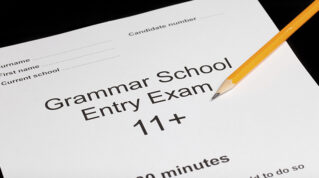An overlooked detail of the schools bill is a change to grammar school ballot legislation, bringing academy grammars in line with local authority schools. The long-forgotten ballot rules offer a complicated means for campaigners to end selective admissions, involving first a petition and then a vote among eligible parents. As it stands, a MAT could take on a grammar school and seek to end selective admissions without any ballot.
It appears Nadhim Zahawi hopes to protect grammar schools from the sort of awful MAT that wants to do that. Instead, he seems to prefer the idea of MATs operating mostly inclusive schools, but also a few that use the 11-plus to select only those pupils who are guaranteed to get great results.
In 2004, an education select committee review of the grammar school ballot process determined it was unworkable “and should be immediately withdrawn”. So of course, nearly 20 years later, the rules are being revisited with absolutely no changes planned whatsoever.
The only ballot that ever went ahead, in Ripon in 2000, allowed 25 per cent of the votes to be cast by parents in fee-paying prep schools, the majority of which were miles from the town. We know parents pay for private primaries because they offer 11-plus test preparation; so is it right to empower feeder schools whose business model requires selective education to continue? The well-funded pro-grammar campaign in Ripon involved professional lobbyists and a slick promotional video.
The ballot rules require campaigners to ask parents to fill out a form with a child’s name, date of birth and school. It’s natural for parents to refuse to give such personal information to a stranger with a clipboard. Ballots do allow parents with pre-school age children to get involved, but only if they post their child’s birth certificate and a utility bill to the Electoral Reform Society. Want a say? That’s £2.85 for recorded delivery.
Meanwhile, schools and local authorities are forbidden from any involvement in a ballot. So there’s no organised debate, no school letters with information; no one is even told how comprehensive education would be implemented.
In Kent, where I live, there are some odd nuances to selective education that would cause problems for any ballot under current rules.
A long queue for places doesn’t equate to popularity
Selective area parents are conditioned to think that ‘smart’ pupils need specialist education. A quarter of pupils is an odd definition of ‘special,’ but that’s the way it is. They don’t consider that comprehensive schools with sets are a suitable alternative.
I have wealthy friends who would only ever consider using a grammar or private school, never a comprehensive. These parents would vote for grammars with no understanding of the negative impact on others, particularly disadvantaged and SEND pupils.
Grammar supporters say selective schools are popular, but they confuse a natural use of these schools with popularity. What parent wouldn’t be proud of their child being labelled ‘smart’? What parent wouldn’t put their child down for top GCSE grades if they could guarantee them? And what parent wouldn’t feel pressure to ensure their child was in a school where they could mix with equally able peers?
These incentives may result in a long queue for school places, but that doesn’t equate to popularity in any positive sense of the word. And it is meaningless in terms of quality education.
But there’s a simple way to find out whether grammar schools are really as popular as Mr Zahawi and others believe them to be: make the route to phasing them out easier.
I’ve met several people who’d hoped to start a grammar school ballot. In each case, they started out full of optimism. But when they learned how the system worked (or rather that it didn’t, and couldn’t), they gave up their plans.
So if Mr Zahawi is sure of their popularity, and if he genuinely wants a “a school system that works for every child, parent and family”, then he should reform the unfair, unworkable, grammar school ballot legislation. Because parents deserve a fighting chance of ending selection in the divided communities where grammars remain.















Your thoughts